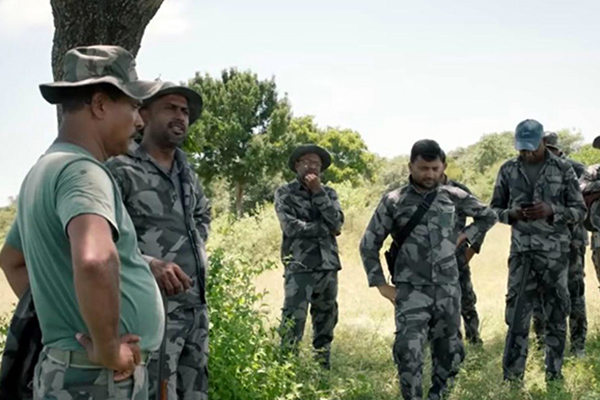Prince William and The Royal Foundation’s United for Wildlife programme have released the newest episode of its groundbreaking docuseries, Guardians, highlighting the individuals at the forefront of wildlife protection and conservation.
This week’s episode focuses on an incredible team of rangers in Sri Lanka working to minimise threats of human-elephant conflict, fostering a more peaceful coexistence between wildlife and the communities living to help save this much-loved species from extinction.
Guardians, which launched in May, seeks to change the narrative around rangers, driving recognition and pride in the vital yet often misunderstood work they do to protect our planet.
In this moving episode, we meet ranger Chinthaka Pathirana, who, for over 20 years, has been a veterinary expert within the Department of Wildlife Conservation's (DWC) Veterinary Clinic in Randenigala. Renowned for his leadership and integrity, viewers learn of the work of Chinthaka and his team as they bravely risk their lives to rescue and monitor elephants, alongside balancing patrolling duties and mitigating conflict.
Sri Lanka is home to the highest density of wild elephants per square mile, with a species population of between 5,000 and 6,000. For decades, humans and elephants have peacefully co-existed, but habitat encroachment, deforestation and agricultural expansion have made this enduring relationship more fragile.
Communities in the region are now experiencing one of the highest rates of elephant-human conflict globally and in 2023, 176 humans and 470 elephants tragically lost their lives. Through immersive film footage, and powerful interviews, this film highlights the emotional and technical efforts of ranger teams as they work to reduce harm to animals whilst minimising impact on humans.
The groundbreaking docuseries was the brainchild of Prince William and to which he has voiced the trailer and individual episode introductions. Each episode focuses on a different ranger community from across the globe and the specific challenges they face in safeguarding often endangered species and fragile ecosystems.
Prince William said: “I’ve had the privilege of meeting a number of rangers throughout my life and have seen firsthand the vital work they do. Yet their stories are often overlooked or misunderstood. The reality is that protecting our natural world has become one of the most dangerous jobs on the planet. We need to understand and recognise Nature’s Guardians, and the critical work they do.
“The rangers we meet in this series are an inspiration to us all. Every day, they take huge risks as nature’s frontline of defence, standing between poachers and endangered species, supporting sustainable human-animal coexistence and fighting habitat loss.
“As they work to protect our oceans, our forests, our plains, our mountains and biodiversity, they are also educating, community building and furthering science. These are the unsung heroes — the true Guardians of the natural world, defending nature and the future of the planet for all of us.”
Elephants are vital to the broader environment in Sri Lanka, acting as "ecosystem engineers," influencing forest structure by creating clearings and pathways and dispersing seeds which diversifies plant life. Without this crucial species, the delicate balance of the local environment would unravel.
Tracking and monitoring elephant movements and behaviour is a central focus for conservation efforts in Sri Lanka, affording rangers crucial information on when and where elephant-human conflict is happening.
The episode shows Chinthaka and his team putting themselves in the path of danger as they fit a GPS collar onto a recently spotted elephant. These cutting-edge GPS technologies provide a lifeline in building a map for coexistence but with each elephant weighing between two and five tonnes, fitting them comes with a very real threat of rangers being tramples or charged. In the gripping sequence, audiences have the rare opportunity to see how the highly skilled team work quickly to attach the collar, whilst minimising the impact to the elephant.
Chinthaka Pathirana, veterinary expert within the Department of Wildlife Conservation said:
"From a young age, we had a connection with the forest. Elephant - human conflicts were not as intense as they are now. Our main objective is to minimise the impact on people and reduce the harm to animals. Looking forward, we hope to increase forest coverage and ensure that wild animals have adequate habitats. So, the role of the ranger is vital.”
The series was co-produced by The Royal Foundation with award-winning studio Zandland and follows the extraordinary stories from rangers across the globe. In addition to the episode based in Sri Lanka, other instalments will explore ranger communities in several other countries.

Leave Comments